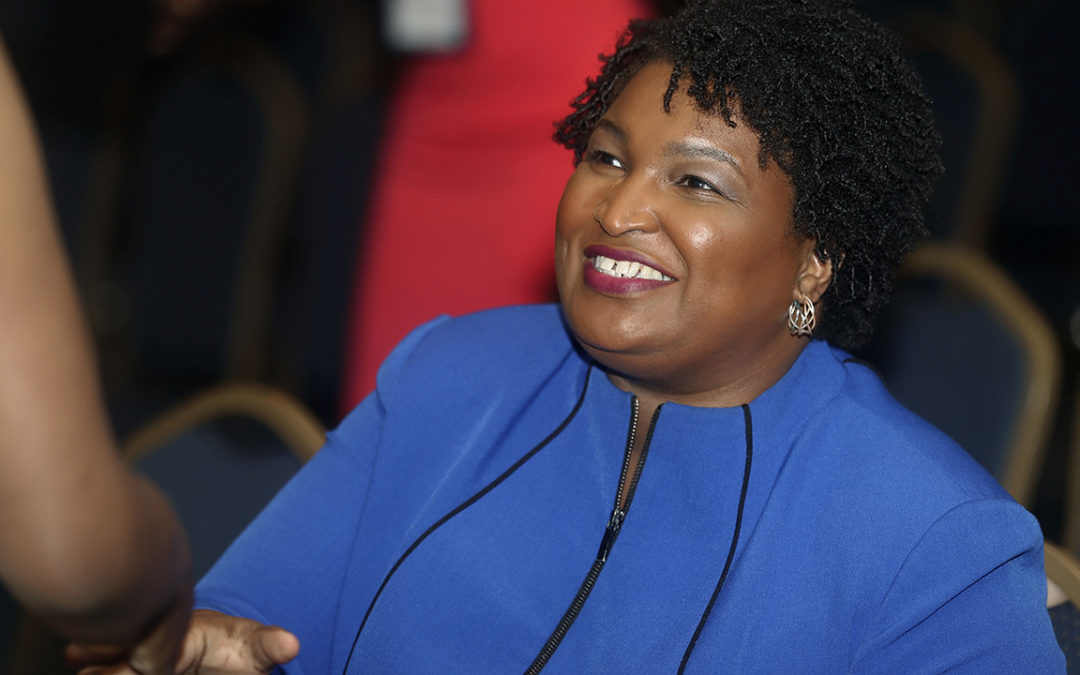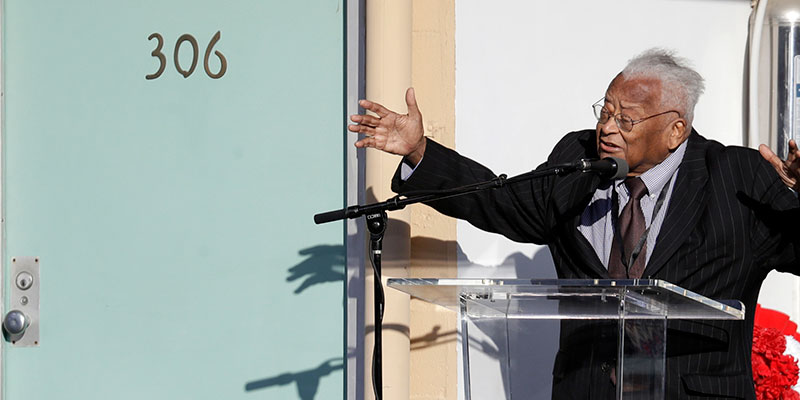
In defeat, Abrams casts aside traditional expectations
Video Courtesy of CNN
Stacey Abrams broke the rules of politics until the very end.
The Georgia Democrat who came about 60,000 votes shy of becoming America’s first black woman governor refused to follow the traditional script for defeated politicians who offer gracious congratulations to their victorious competitor and gently exit the stage. Instead, Abrams ended her campaign in an unapologetically indignant tone that established herself as a leading voting rights advocate.
“I acknowledge that former Secretary of State Brian Kemp will be certified as the victor in the 2018 gubernatorial election,” Abrams said in a fiery 12-minute address. “But to watch an elected official … baldly pin his hopes for election on the suppression of the people’s democratic right to vote has been truly appalling.”
“So let’s be clear,” Abrams concluded, “this is not a speech of concession.”
Ending a race while pointedly refusing to concede would typically risk drawing a “sore loser” label that would be impossible to shake in any future political campaign. But Democrats and even some Republicans say she is likely to emerge from the closely fought governor’s race with her political future on solid ground.
“There was a time when this may have been a bad look, but I’m not sure that’s where we are in politics anymore,” said Jen Palmieri, who served as communications director for President Barack Obama’s White House and to Hillary Clinton’s 2016 presidential campaign.
“For many years, people have been too concerned about the optics of their actions as opposed to the impact of their actions,” Palmieri added, saying that addressing some voters’ lack of faith in the system is “more important than worrying what might offend people who may or may not vote for you four years from now.”
Republican Rick Tyler, a top adviser to Sen. Ted Cruz’s 2016 presidential campaign, said “botched concessions have hurt people before,” but he said it’s too simple to say Abrams “botched” anything because some of her criticism has merit.
“I wish we could all have faith in the system and the process,” Tyler said. “Then we could count votes, listen to gracious concession speeches and all just move on. That’s not where we are.”
Abrams cited a litany of problems that she said add up to systemic voter suppression. She specifically pointed to absentee ballots thrown out by what she called “the handwriting police,” a shortage of paper ballots to back up broken-down voting machines and Georgia’s so-called “exact match” voter registration rules that require information on voter applications to precisely match state and federal files.
While state law allows “no viable remedy,” she said she plans to file federal legal action challenging various aspects of the electoral system Kemp oversaw until he resigned as secretary of state two days after the Nov. 6 election. She also launched the new non-profit group “Fair Fight Georgia” to advocate for changes.
Some Republicans rebuked her approach.
“She seems to think there are only two branches of government: executive and judicial,” said Debbie Dooley, a Georgia-based activist who was among the early national tea party leaders. “I’m just disappointed that her immediate adversarial response is to file lawsuits when there are a lot of people on the Republican side who see a need for some of the reforms she wants.”
For starters, Dooley cited an absentee ballot process that varies from county to county and Georgia’s reliance on electronic voting machines with no paper trail — a system a federal court already has ordered changed after the 2018 elections.
“If they try to do it all through the federal courts, it’s going to end up with people resenting her,” Dooley predicted.
Abrams said “pundits and hyper-partisans” would object to her flouting “normal order” for losing candidates. “I should be stoic in my outrage and silent in my rebuke,” she said of conventional expectations. “But stoicism is a luxury and silence is a weapon for those who would quiet the voices of the people.”
Georgia Democrats said Abrams has little choice but to continue highlighting problems.
“The middle ground here is simple: ‘Count every vote,'” said Allegra Lawrence-Hardy, Abrams’ campaign chairman.
Buddy Darden, a former congressman who chaired the campaign of Abrams’ Democratic primary rival, agreed. Darden, who is white, said Abrams proved wrong the “old dinosaurs like me” who thought a black woman couldn’t compete in a general election in the Deep South. “She did it by getting folks out that no one else could,” Darden said. “Now she has their back, and that’s a good thing for the party, a good thing for the state.”
Palmieri, the former Obama and Clinton adviser, said Abrams can fill an important national void. Republicans, she said, have spent a generation focused on passing GOP-friendly voting rules, redrawing district boundaries and electing like-minded secretaries of state like Kemp. The left has answered with a less-effective patchwork of lawyers and think tanks. “She would be a formidable force on that front,” Palmieri said.
Lawrence-Hardy and other Abrams confidants say she’s not considered future runs for office. The next chance would be to challenge for Republican Sen. David Perdue’s seat in 2020, though those close to Abrams say her policy interests are better suited to the governor’s office.
History offers some parallels.
Democrat Al Gore fell just short of the presidency in 2000 after a U.S. Supreme Court ruling that affirmed Republican George W. Bush’s victory in Florida. Gore never returned to politics, but established himself as a leading advocate for addressing climate change.
Republican Richard Nixon lost a bitter presidential election to John Kennedy in 1960, followed by a loss in the 1962 California governor’s election, prompting a bitter concession speech in which he declared himself done with politics. Six years later, he was elected president, capitalizing on Democrats’ Vietnam-era disarray.
Cruz found himself in Republican crosshairs in 2016 when he spoke at the Republican convention but notably refused to endorse then-nominee Donald Trump for president. Weeks ago, Trump and Cruz embraced on a Texas campaign stage, helping Cruz to a hard-fought re-election victory to the Senate.
The lesson, Palmieri said, is that “voters let these things play out.”

